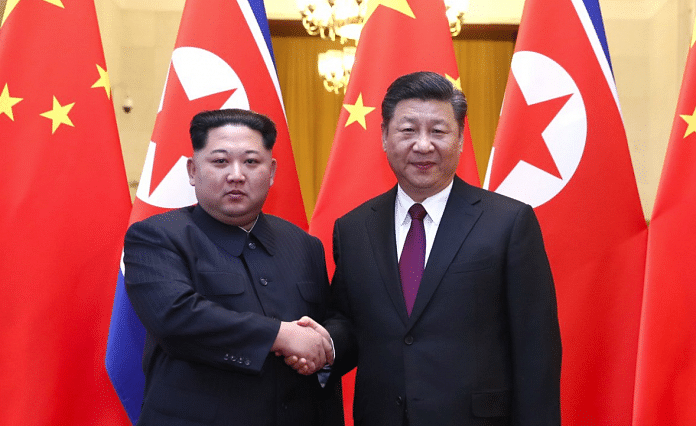Kim Jong-un will meet South Korean president Moon Jae-in later this week and with Donald Trump later this month. If a diplomatic decision is reached, China could find itself losing influence in the region. South Africa is facing a lot of unnecessary heat for its deep-rooted corruption, and a Palestinian teenager was shot in the head by Israeli snipers during a peaceful protest, eroding Israel’s international standing.
China shouldn’t be left out
Chinese influence “will be key to denuclearisation of the Korean peninsula,” writes the South China Morning Post in an editorial. This is why it shouldn’t be sidelined during the high-level meetings between North Korea, South Korea and the United States.
“China is eager that the talks, between Kim and Moon at the Korean truce village of Panmunjom on Friday, and the North’s leader and Trump at a location to be determined in either late May or June, will go smoothly.”
“Kim’s thawing of chilly relations with Beijing with a landmark summit with President Xi Jinping last month and Song’s reciprocal visit, which included talks and a banquet, have revealed Pyongyang’s willingness to seek change.”
“The friendly atmosphere and the positive direction gives Kim an ally and assurances for the upcoming negotiations. He needs such backing; Trump’s unpredictability was apparent on Wednesday, with him saying that if the talks were not fruitful, he would “walk out”, despite earlier contending that good relations had been forged by Pompeo.” Mike Pompeo, the CIA director and Trump’s nominee for Secretary of State, visited Pyongyang earlier this month.
“Pompeo was the highest-level US official to visit the North since 2000. Pyongyang has a long record of breaking promises, so there has to be a large dose of reality. With China’s influence, though, driven by a desire for a peaceful and stable region, there is at least cause for hope.”
South Africa isn’t the most corrupt country in the world
“It may seem unfair to single out South Africa for its corruption. It’s not the worst offender in sub-Saharan Africa, and far from the worst in the world — India, China and Russia rank far worse on the Transparency International list, and South Africa has functioning democratic institutions and a lively press. But countries should be measured less against the rest of the world than against their own potential and promise, and on that score, the same African National Congress that Nelson Mandela led to a triumphant victory over apartheid a quarter century ago has become gorged on corruption,” editorialises the New York Times.
A recent report found that South Africa remains “one of the most unequal countries in the world”, and the gap between income groups have widened since the end of apartheid. But the country is changing, which is evident from ex-president Jacob Zuma’s ousting from the ANC, and Cyril Ramaphosa’s subsequent succession to president.
“Yet while the flawed transition may explain the rise of corruption, it cannot justify the perfidy of officials who were reared on the ideals and aspirations of the movement Mr. Mandela led.” The corruption described, the editorial board writes, “is not simply bribery, but rather elaborate schemes to siphon off tens of billions of public dollars intended to improve the lives of the very people the A.N.C. promised to lead to a new, equal and just nation.”
“That is one reason that it is fair to single out South Africa. Another is that the “beloved country” of Alan Paton’s South African classic has the democratic tools to combat the blight of corruption, as the unfolding case against Mr. Zuma demonstrates. The question is whether Mr. Ramaphosa or the A.N.C. are any longer capable of wielding them.”
The Gaza protests are being violently suppressed
“The use of lethal force to cow nonviolent demonstrations by Palestinians erodes Israel’s standing internationally and damages its democracy at home,” argues the The Guardian in an editorial.
A Palestinian teenage was shot while peacefully protesting near a border fence, and while the Israeli government initially dismissed calls for an investigation, it gave in under immense international pressure.
“The soldiers’ use of live ammunition against unarmed demonstrators is an affront; but it is in line with the brutal attitudes towards Palestinians that have become normalised by Israeli politicians. The snatching of life from a few dozen people and the maiming of 1,700 more over the past four weeks are an indication of what Israel thinks is a fair price to pay to keep Gaza in check. A journalist has been shot dead and ambulances fired upon. This awful pummelling of a besieged population is not solely, as the Israeli military claim, to protect a border fence. It is to cow people into submission. The signs are that it will not.”
“The subjugation of Palestinians erodes Israel’s standing internationally and damages its democracy at home. Its politics are polluted by anti-Arab bigotry. As Israel grows richer, Palestinian destitution becomes more troubling. Its dilemma grows more acute as the number of Palestinians in the Holy Land approaches that of Jews. Israel cannot hold on to all of the land between the Jordan river and the Mediterranean, keep its Jewish identity and remain a democracy. It is in Israel’s interest to accept that Palestinians need a state as much as Israelis do. Otherwise, the choices are a single entity in which Jews could eventually be a minority; a form of apartheid; or perpetual occupation. Hollywood stars like Natalie Portman have understood the dangerous turn Israel is taking. It would be a good idea if the nation’s leaders did too,” the Guardian writes.



